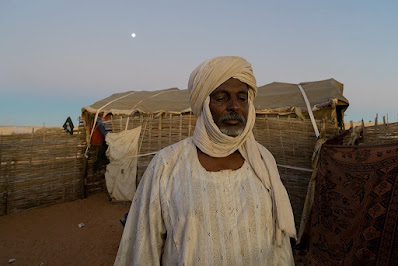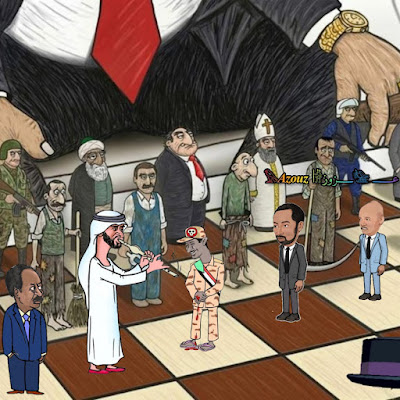Blood, sand and gold: victor’s city rises from ashes of Sudan’s civil war
Report from the The Observer - www.theguardian.com
Observer dispatch Darfur
By KLAAS VAN DIJKEN
Dated Saturday 29 February 2020, 17.05 GMT
Photo: Children at the school in Zurrug sing anti-racism songs that praise the Rapid Support Forces. Photograph: Klaas van Dijken/Lighthouse Reports
Zurrug is one of the few towns on Earth that has yet to appear on Google maps. After nightfall, its sparse shacks are illuminated by campfires that throw shadows over pick-up trucks mounted with anti-aircraft guns – the only hint of the violent past of this outpost in Darfur, Sudan’s troubled western province.
The town is being built on the spoils of a brutal war that once tore at the conscience of the world. The victors in that conflict have grand plans for this settlement based on a winner-takes-all vision for their home region – a vision that clouds the future of the whole of Sudan.
The Observer was given unprecedented access to this remote area of Darfur by the Rapid Support Forces, a paramilitary group whose influence stretches from Sudan’s borderlands with Chad and Libya to the capital, Khartoum, where protesters last year toppled 30-year dictator Omar al-Bashir.
The RSF wants to show off a future city as evidence of the peace it has brought to this contested land. To the vanquished – scattered in their millions across desperate refugee camps within and beyond Sudan’s borders – Zurrug is an insult being built on stolen land.
Darfur and Bashir were back in the headlines last month when Sudan’s transitional government agreed to hand over the ousted president to the international criminal court to face charges of crimes against humanity. These crimes took place in Darfur from 2003, when Bashir unleashed Arab militia, with the backing of the Sudanese army, to crush an insurgency by black African tribes. What began as ethnic clashes over land and water escalated into a crisis that prompted western public demonstrations, celebrity activism and a genocide investigation.
Those armed herders were known at the time as the Janjaweed, or “devils on horseback”. Today they are called the RSF. Their leader, Mohamed Hamdan Dagalo – long referred to as Hemedti – is Bashir’s heir apparent. A renowned and ruthless commander, he was called by Bashir “my protector”, a role that helped him become the wealthiest man in Sudan.
Zurrug is a world away from Khartoum, where riverine Arab elites created a metropolis thanks to their dominance of politics and economy. This makeshift town is a 10-hour drive across the vast plateau from Darfur’s northern city of El Fasher.
In its current form, Zurrug’s market has stalls hawking anything from Chinese phones to sacks of beans. The prefab clinic and school are speckled with the letters “UN”, a reminder that they have been jerry-built from the wreckage of the shrinking peacekeeping mission to Darfur, Unamid.
Photo: Rapid Support Forces on the way from Kutum towards Zurrug. Photograph: Klaas van Dijken/Lighthouse Reports
According to plans seen by the Observer, Zurrug will become a city. The documents call for residential areas, a hospital and town squares. Officials from Saudi Arabia and the United Arab Emirates visited in 2018 promising to help finance the work, including an international airport.
For now, two water towers mark the entrance to the town, placed there to slake the thirst of the camels, which vastly outnumber either people or vehicles. The largest house belongs to Juma Dagalo, the area’s chief and Hemedti’s uncle. “We were nomads, but now we want to develop ourselves, so we have to settle and send our children to school,” he said.
In his telling, Zurrug belongs to his ethnic group, the Mahariya, having been gifted to them by their former colonial masters, the British. The chief, who brought Hemedti up, says the land was empty.
This story of empty land is bitterly disputed by community leaders in the camps in north Darfur. They claim Zurrug is on land they inhabited for centuries before being forced to leave by the RSF, who used the same tactics – murder, rape and robbery – as the Janjaweed. One of these communities is the Zaghawa, a black African ethnic group who bore much of the brunt of the war crimes alleged in Bashir’s ICC indictment.
Mohamed Ibrahim, a Zaghawa chief or umda, said: “What Juma Dagalo is saying is not true. Zurrug was not empty land. We have our farms there but we cannot harvest. The RSF denies us access.”
Injustice and asymmetric war on civilians dominated much of the three decades that Bashir spent in power. His hold on office relied on a complex of alliances that spanned the Islamists, the army and support among the Arab middle class. Last year the regime collapsed as demonstrators in the cities demanded a civilian government. But insiders claim that Bashir stepped down only when Hemedti refused to use the RSF to crush the demonstrations. The protector switched allegiances from Bashir to the protestors in a move that saw him expand his support base far beyond Darfur.
“I stood beside the Sudanese people,” Hemedti told the Observer from his gilded residence in Khartoum. “A massacre would have happened herein Khartoum, a genocide would have happened on 11 April without our existence.”
The RSF is sanctioned by the state but its allegiance is to Hemedti, not Sudan’s army. His leadership of what is effectively a private army has reportedly helped him make a fortune from gold, construction and alleged smuggling. Hemedti denies that the men he commands perpetrated atrocities, either in their former guise as the Janjaweed or more recently as the RSF.
Today, Hemedti, whose Mahariya clan is part of the populous Rizeigat tribe, is vice-chairman of the sovereign council, the transitional body that is meant to guide Sudan to a new civilian government. But his credentials as protector of the people were stained in June last year when soldiers – many in RSF uniforms – attacked a civilian sit-in in the capital. More than 150 people were killed and many woman were raped. Hemedti denies ordering the violence and blames elements of the former regime seeking to discredit him. His denial is dismissed by most of the protest groups.
Photo: Mohamed Hamdan Dagalo, known as Hemedti, the RSF leader. Photograph: STR/AP
Meanwhile, a struggle is being waged inside the Sovereign Council, and on the streets, to make good on the promise of a transition to civilian rule. The army retains a powerful, possibly decisive voice on the council. Straddling it all is Hemedti, not beholden to Sudan’s army, confident in his wealth and political support. He has the backing of influential Gulf States, cemented by sending the RSF to fight in Yemen alongside Saudi proxies in yet another gruesome conflict.
For now, Hemedti prefers to whitewash the RSF’s recent and deeper past, saying his forces have brought safety and stability to Darfur. On the issue of land, he appears magnanimous: “Whoever took land or built anything on land which is not his, he has to leave it. Everybody has to take his own old land.”
But those who have done the taking in north Darfur are overwhelmingly Hemedti’s own Mahariya people. His uncle, Juma Dagalo, has toured the region enticing members of his own ethnic group to come and settle in Zurrug and six other proto-towns around it. Each one has the same school and clinic, recycled from the UN bases. The teachers and doctors are on Hemedti’s payroll. Water towers, a practical and symbolic way of staking claim to land, have started to appear – all financed by the RSF.
A report last year from the UN panel of experts for Darfur concluded that development around Zurrug was meant to lure people from the cities. It also warned that it had the potential to “become a new source of conflict”.
The land issue is far from buried, and Darfur is part of the same negotiations between Sudan’s transitional government and various rebel groups that saw Bashir offered up to the ICC. Whatever those talks conclude, the facts on the ground are already being changed, with mono-ethnic settlements expanding every day.
After dark in Zurrug the children of the Mahariya gather around a single lightbulb to recite passages from the Qur’an. During the day they sing songs that mash up anti-racism slogans with praise for the RSF. These anthems would ring hollow with the disenfranchised Zaghawa, who have formed committees in their camps and written letters to Sudan’s new leadership. They have had no response and their leader, Mohamed Ibrahim, warns: “If we can’t solve this peacefully, we will take up arms again.”
Source: https://sudanwatch.blogspot.com/2020/03/sudan-blood-sand-and-gold-victors-city.html
[Ends]










